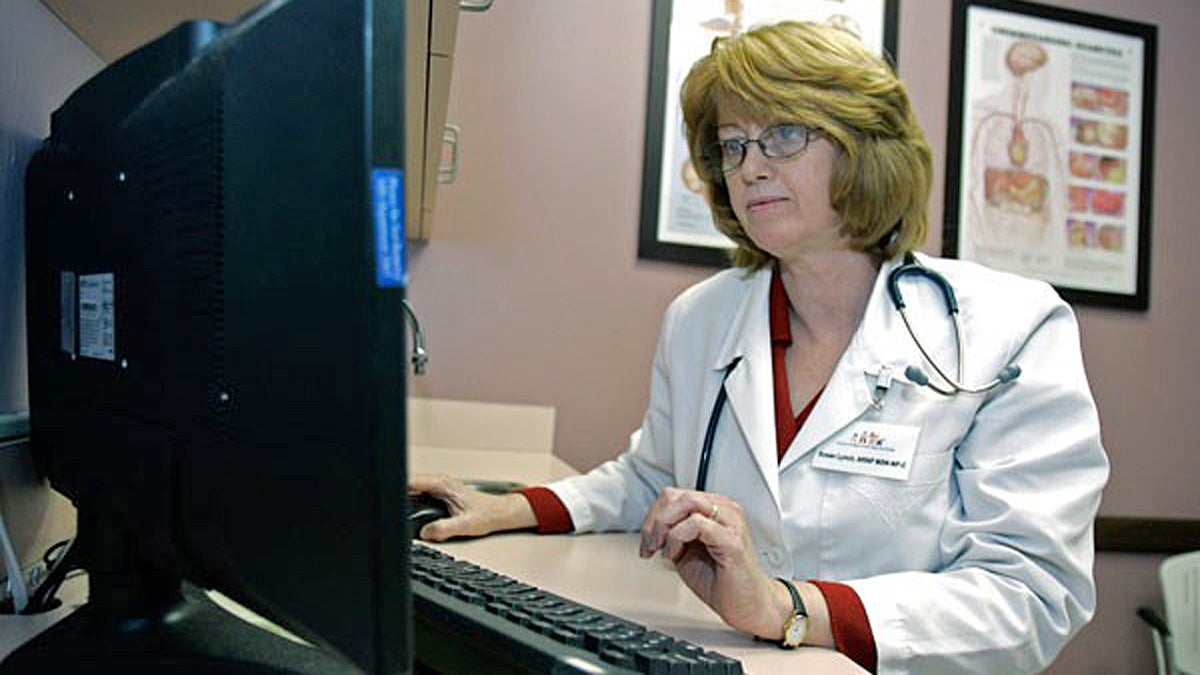Pa. bill would allow nurse practitioners to work independent from doctors

Susan Lynch, a nurse practitioner, checks over a patients electronic medical records (John Raoux/AP Photo)
Pennsylvania lawmakers are proposing to allow nurse practitioners to operate independent of doctors. Supporters say the move would improve access to quality care at a time when more and more patients are entering a strained health system, but physician groups aren’t on board.
Nurse practitioners are registered nurses with advanced degrees. They can do a lot of things that doctors can do. In Pennsylvania, that means diagnosing, managing chronic diseases, prescribing drugs and even signing death certificates. They can run their own practice, but they must work under a collaborative agreement with a doctor. The physician does not ever have to be on site. The agreements may involve paying anywhere from $500 to $1,000 a month to the doctor.
State representative Jesse Topper, of Bedford County, is sponsoring legislation to end that collaborative requirement. He says such agreements make it harder for nurses to practice, especially in rural, underserved areas.
“I’m looking for ways to try and provide more accessibility and more affordable health care to these communities, and I think allowing nurse practitioners to practice within the scope of their authority, what they’re trained, what they’ve been certified to do, is a good step in that direction,” Topper said.
He says beefing up primary care across the state is especially important, as more people gain coverage under Pennsylvania’s expanded Medicaid. An estimated 500,000 residents are newly eligible.
Similar legislation is in the works in the state senate. A bill was introduced for the first time last year in that chamber, but it didn’t go anywhere.
The current measure, House Bill 765, is already meeting resistance from the state’s main physician group, the Pennsylvania Medical Society, which argues that NP’s should not take the place of doctors.
“The concern is as practicing independently, there’s no oversight,” said Dr. Karen Rizzo, president of the medical society and ENT doctor in Lancaster. “We support team based care, and we feel that’s the best way to provide the highest quality and to enhance patient safety. And as a team, the physician should be the leader of the team because of the education, knowledge and clinical experience that they have.”
Meanwhile, backers of such legislation include the AARP, the Institute of Medicine and the National Governor’s Association.
Susan Schrand, a family nurse practitioner and director of the Pennsylvania’s Association of of Nurse Practitioners, says the change would allow nurses to work to their full abilities in places that need more providers.
“It’s really about getting all hands on deck and getting all health care practitioners together to provide care to our communities,” said Schrand, who adds that some NP’s face challenges in finding doctors who will contract with them. In other instances, a doctor retires or moves elsewhere, putting that NP in a bind.
“Removing the collaboration agreement that’s required in Pennsylvania is not going to diminish how we collaborate with our colleagues in pharmacy, physical therapy and in medicine. We will still very much collaborate. That’s the nature of our practice.”
According to Schrand, about 9,500 nurse practitioners are licensed in Pennsylvania.
Twenty states do not require collaborative agreements. Delaware and New Jersey do.
WHYY is your source for fact-based, in-depth journalism and information. As a nonprofit organization, we rely on financial support from readers like you. Please give today.

